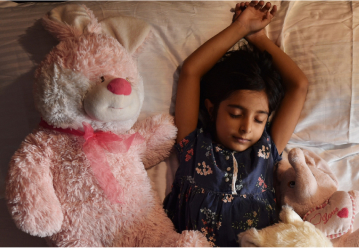Bedwetting (Nocturnal Enuresis)

Ditching diapers at night is the last milestone in diaper training. For most children, this occurs by the age of 5. Nocturnal enuresis, also known as bedwetting, involves children aged 5 or older who cannot control their urine during sleep, resulting in bedwetting incidents typically once or twice per night. Around 10 percent of six-year-olds face nightly bedwetting, while 5 percent of ten-year-olds are still affected. This condition impacts over five million U.S. children, leading to lower self-esteem and hindering social activities like camps and sleepovers. For parents, bedwetting can be a source of frustration, expense and time commitment.
Our Approach
Our pediatric urology department has an experienced, devoted team of urologists, urology nurses and a nurse practitioner to assist in bedwetting treatment strategies. We provide accessible and collaborative support, reminding your child they are not alone and offering tailored treatment plans.
About Bedwetting
Bedwetting can occur due to various factors. It's essential to stress that it's never the child's fault or a matter of laziness. Nighttime control involves a natural process regulated by a hormone called vasopressin, which reduces urine production during sleep. Many children with bedwetting don't have enough vasopressin, suggesting that bedwetting is often linked to a delay in the development of this hormone. Other causes of bedwetting can include:
- Genetics (family history of bedwetting)
- Overactive or small bladder
- Excessive nighttime urine production
- Sleep issues such as deep sleep (not waking from bladder signals), sleep apnea, sleepwalking or heavy snoring
- Urinary tract infections (UTIs)
- Anatomical urology issues or a neurogenic bladder
- Constipation (full rectum pressure affects bladder function during the day and night)
- Emotional stress or changes in routine ADHD or Autism
Treatment
About 15 percent of children age 5 are still bedwetting, and every year about 15 percent outgrow it on their own. It is not harmful to your child other than its potential impact on self-esteem. However, many treatment strategies are available to help speed up the process. It’s important to note that these can still take some time.
Treatment Strategies
- Daytime habits can significantly help, these include: timed voiding or having your child urinate every two hours during the day, proper hydration (drinking about half their weight in ounces of water a day), limiting soda and citrus juices which can irritate the bladder and reducing caffeine which can be found in soft drinks
- Addressing constipation by ensuring your child is getting enough fiber in their diet, is properly hydrated and has regular periods of sitting on the toilet every day. We may suggest MiraLAX if constipation persists
- Twenty percent of kids may stop bedwetting with these measures alone, but if it persists, other treatment options are available. These include:
- Desmopressin (DDAVP) pills lessen nighttime urine production and are taken roughly 1 hour before bedtime. This medicine mimics the hormone vasopressin and is safe when fluid intake is controlled at night. It's suitable for daily use or as needed (sleepovers, etc.). While not a cure, desmopressin aids during a child's maturation process
- Bedwetting alarms wake kids during accidents as soon as they detect moisture, helping them learn to wake themselves. Waking your child up at random times won’t help in the long run, but the alarm can actually cure bedwetting entirely with time
- Counseling to address any psychosocial stressors
If treatments fail, other tests, medications and strategies can be explored